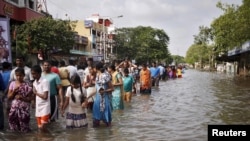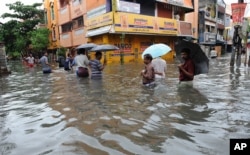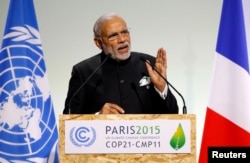The worst rains in more than a century in India’s southern city Chennai are drawing attention to the subcontinent’s vulnerability to extreme weather events at a time when world leaders are meeting in Paris to address climate change.
The incessant downpour that has battered Chennai broke Thursday, but tens of thousands of people in the coastal metropolis remained stranded on rooftops or were forced out of homes as the city remained deluged.
The rainfall since Tuesday night has virtually turned most of the city of 4.6 million people into a gigantic pool, paralyzed the airport, and cut off power connections.
In parliament, Home Minister Rajnath Singh underlined the scale of the deluge faced by the city. “Chennai received 330 millimeters of rain in 24 hours. This was 252 millimeters more rain than the city receives in the entire month of December,” he said.
The situation worsened as water had to be released from a lake on the outskirts of Chennai after its level rose dangerously high.
Hundreds of personnel from the armed forces, police and disaster teams have mounted a massive rescue operation, with helicopters and boats being used to rescue people stranded in water logged areas. Air force helicopters threw food packets.
Thousands of people stuck at the airport, which has been shut, are being taken to a nearby naval base. Train services in and out of the city have virtually ground to a halt. Two hundred sixty-nine people have died since the start of November due to the heavy rains.
More rains expected
The city’s woes may not end soon with the meteorological office forecasting more heavy rain in the coming days. The rains have been attributed to a low pressure area in the Bay of Bengal – southern India gets rain between October and December from retreating monsoon winds.
India’s Environment Minister, Prakash Javadekar, said that the freak rainfall in Chennai cannot be directly attributed to climate change.
Climate experts agreed, but also pointed out that rising global temperatures have led to a rise in the intensity of rain spells.
And on the sidelines of the ongoing climate summit in Paris, negotiators from developing countries and civil society groups flagged the flooding in Chennai as an example of how countries like India have become vulnerable to extreme events caused by climate change such as droughts, heavy rainfall etc.
“If you see the past trends from the high intensity rainfall in Kashmir, to the events in March where we had hailstorms, to now unusual rainfall that is happening in Chennai, you can draw a parallel that climate change is also a part of the reason. But at the same time it is not only climate change but also bad urban planning,” said Rakesh Kamal with the Center for Science and Environment in New Delhi.
Modi's concerns
Before attending the ongoing U.N. climate summit in Paris earlier this week, Indian Prime Minister Narendra Modi, had tweeted: "We are feeling the impact of fast-paced climate change."
Speaking in Paris on Monday he called for a strong agreement on what is being called ‘loss and damage’. This is a clause that developing countries want included the final climate agreement to ensure compensation for victims of climate change from richer countries for environmental damage done by them over decades as they industrialized.
India has long argued that richer countries must both pay vulnerable countries to adapt and agree to greater reductions in the amount of greenhouse gases they emit.
Arunabha Ghosh, who heads the Council of Energy, Environment and Water in New Delhi said that climate change is already costing India billions of dollars. “In the past five years, extreme events have already resulted in a loss and damage in India of between $25 to $30 billion. India in 2013-14 spent nearly $92 billion on adaptation and related activities and building capacity.
That sum is going to rise up to about $360 billion in 2030. In effect between now and 2030 we will need about $1 trillion worth of investment in adaptation activities alone. This is the kind of scenario we are presented with.”
Developed countries want India to reduce its reliance on coal-based energy, which is set to grow rapidly.






